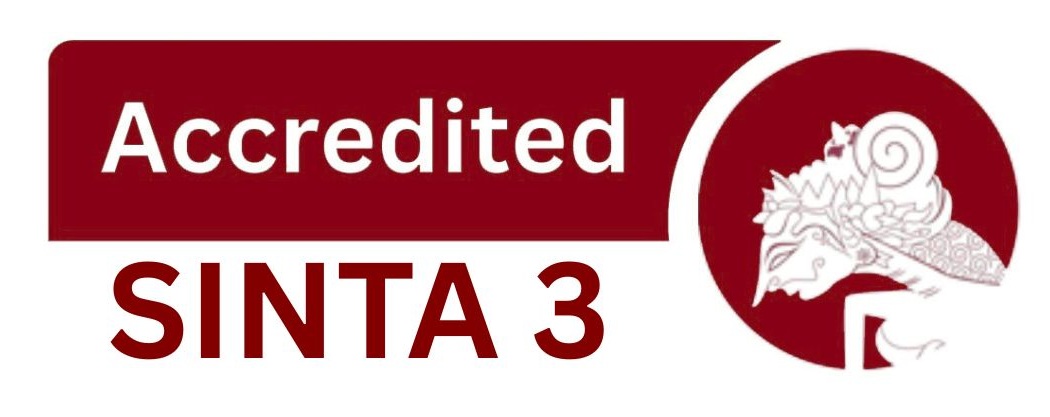AN ANALYSIS OF POLITENESS STRATEGIES IN ESP ONLINE INTERACTION
Abstract
Politeness strategies play a crucial role in maintaining social harmony and effective communication, particularly in language learning settings. Some studies have explored the use of politeness strategies in EFL offline classes, emphasizing their role in fostering interaction between students and instructors. However, few studies have focused on online interaction in the context of English for Specific Purposes (ESP) context. This study investigates and analyzes the types and functions of politeness strategies produced by ESP students and a lecturer in online interaction via WhatsApp group. The participants were sophomore accounting students at a private university in Banten. Their use of politeness strategies in requesting assignments, seeking confirmation, and other academic interactions was analyzed using Brown and Levinson’s politeness strategy framework. The results revealed that: (1) positive politeness strategies were most frequently used in the WhatsApp interaction, and (2) these strategies contributed to fostering harmonious relationships and minimizing conflict in online communication. The findings highlight the importance of developing pragmatic awareness in online interaction, and guide future research to investigate politeness in different contexts.
References
Adel, S. M. R., Davoudi, M., & Ramezanzadeh, A. (2016). A Qualitative Study of Politeness
Strategies Used by Iranian EFL Learners in A Class Blog. Iranian Journal of
Language Teaching Research, 4(1), 47-62. doi: 10.30466/ijltr.2016.20377
Amanda, Y. T., Herlina, R., & Ratnawati, R. (2021). The Analysis of Politeness
Strategies on EFL Students’chatting Group Interactions. Journal of English Education Program (JEEP), 8(2), 129-140.
https://doi.org/10.25157/(jeep).v8i2.6429
Brown, P., & Levinson, S. C. (1987). Politeness: Some universals in language usage (Vol.
4). Cambridge university press.
Eshghinejad, S., & Moini, M. R. (2016). Politeness Strategies Used in Text Messaging:
Pragmatic Competence in an Asymmetrical Power Relation of Teacher–Student.
Sage Open, 6(1). https://doi.org/10.1177/2158244016632288
Fauzi, W. J., Ibrahim, N., & Maros, M. (2014). Perception of impoliteness in counter service
discourse. Procedia - Social and Behavioral Sciences, 118, 118–125.
https://doi.org/10.1016/j.sbspro.2014.02.016
Fitriyani, S., & Andriyanti, E. (2020). Teacher and students’ politeness strategies in EFL
classroom interactions. IJELTAL (Indonesian Journal of English Language Teaching
and Applied Linguistics), 4(2), 259. https://doi.org/10.21093/ijeltal.v4i2.473
Izadi, A. (2013). Politeness in spoken review genre: Viva voce context. Pertanika Journal
of Social Sciences and Humanities, 21(4), 1327–1346.
Jenks, C. J., & Seedhouse, P. (2015). Applying global perspectives on ELT classroom
interaction to current issues in language teaching. International perspectives on ELT
classroom interaction, 219-226. https://doi.org/10.1057/9781137340733_13
Kavanagh, B. (2016). Language & communication emoticons as a medium for channeling
politeness within American and Japanese online blogging communities. Language
Sciences, 48, 53–65. https://doi.org/10.1016/j.langcom.2016.03.003
Mahmud, M. (2019). The use of politeness strategies in the classroom context by English
university students. Indonesia Journal of Applied Linguistics, 8(3), 597–606.
https://doi.org/10.17509/ijal.v8i3.15258
Modesta, E., Sembiring, B., & Sianturi, S. (2021). Politeness strategies in online learning
interaction: Exploring politeness in whatsapp text messaging during covid-19
pandemic. Majalah Ilmiah Methoda, 11, 89–96.
https://doi.org/https://doi.org/10.46880/methoda.Vol11No2.pp89-96
Mulyono, H., Amalia, D. R., & Suryoputro, G. (2019). Politeness Strategies in Teacher-
Student WhatsApp Communication. PASAA: Journal of Language Teaching and
Learning in Thailand, 58, 295-318.
Nurmawati, N., Atmowardoyo, H., & Weda, S. (2019). An analysis of positive politeness
strategies to promote effective interaction in the classroom. ELS Journal on
Interdisciplinary Studies in Humanities, 2(2), 171–181. https://doi.org/10.34050/els-
jish.v2i2.6340
Pratama, H. (2019). Linguistic Politeness in Online Communication. LPPM Universitas
Negeri Semarang.
Rajagukguk, Y., Sinambela, E., & Pasaribu, A. N. (2021). Politeness strategy and principles
used in conversation on green book film. International Journal of Educational
Research & Social Sciences, 568–573.
Sembiring, E. M. B., Sianturi, S., Simanjuntak, F. M. P., & Tarigan, S. N. (2021). The
students’ strategies in online learning interaction: exploring politeness in Google
classroom during Covid-19 pandemic. Elsya: Journal of English Language
Studies, 3(3), 205-214.https://doi.org/10.31849/elsya.v3i3.6725
Senowarsito. (2013). Politeness Startegies in teacher-student interaction in an EFL
classroom context. TEFLIN Journal, 24, 82–96.
Surani, D., & Chaerudin, A. R. (2020, April). WhatsApp grouping class for increasing
students’ English ability. In Twelfth Conference on Applied Linguistics (CONAPLIN
2019) (pp. 25-28). Atlantis Press. https://doi.org/10.2991/assehr.k.200406.006
Syting, C. J. O., & Gildore, P. J. E. (2022). Teachers’ linguistic politeness in classroom
interaction: A pragmatic analysis. World Journal of English Language, 12(8), 133–
141. https://doi.org/10.5430/wjel.v12n8p133
Tan, H. K., Teoh, M. L., & Tan, S. K. (2016). Beyond “greeting” and “thanking”: Politeness
in job interviews. 3L: Language, Linguistics, Literature, 22(3), 171–184.
https://doi.org/10.17576/3l-2016-2203-12
Peng, L., Cai, L & Tan, X. (2012). Research on college teachers’ politeness strategies in EFL
classrooms. Journal of Language Teachinig & Research, 3(5), 981–991.
https://doi.org/10.4304/jltr.3.5.981-991
Valdellon, I. G. R., & Cuarte, R. R. (2024). A pragmatic analysis on politeness strategies
used in online class. International Journal for Multidisciplinary Research, 6(6), 1–
31. https://doi.org/10.36948/ijfmr.2024.v06i06.30878
Zhang, Q. (2022). Politeness in online educational discourse: Exploring relational work
strategies in online teacher-student interactions. Open Journal of Social Sciences,
10(07), 245–261. https://doi.org/10.4236/jss.2022.107021
Downloads
Published
Issue
Section
License

This work is licensed under a Creative Commons Attribution-ShareAlike 4.0 International License.
The author is responsible for acquiring the permission(s) to reproduce any copyrighted figures, tables, data, or text that are being used in the submitted paper. Authors should note that text quotations of more than 250 words from a published or copyrighted work will require grant of permission from the original publisher to reprint. The written permission letter(s) must be submitted together with the manuscript.











